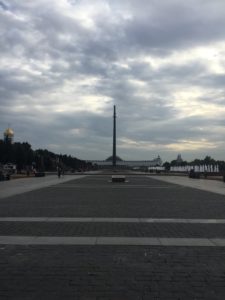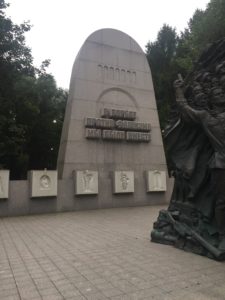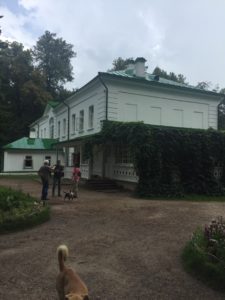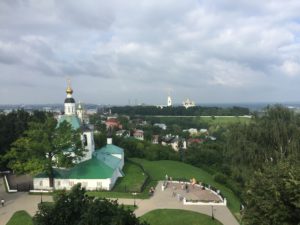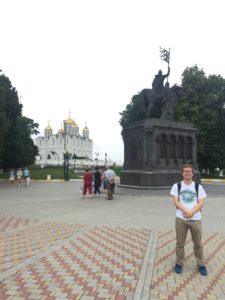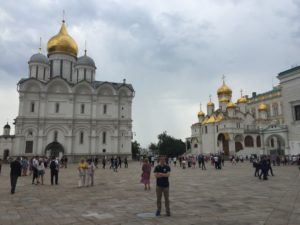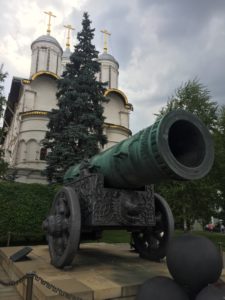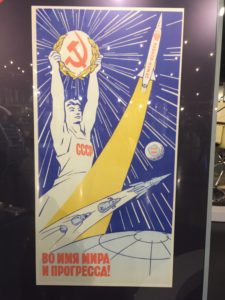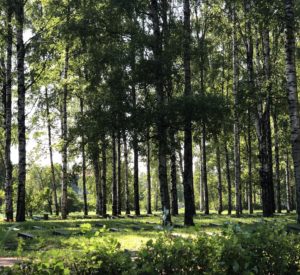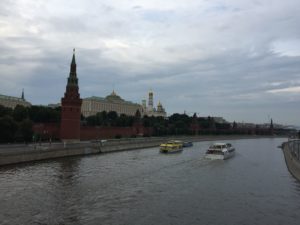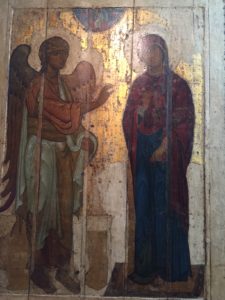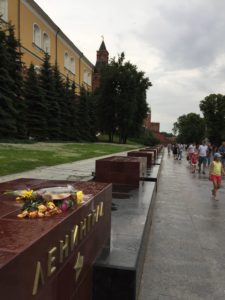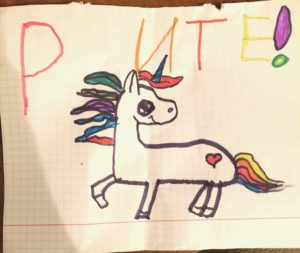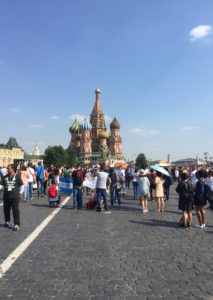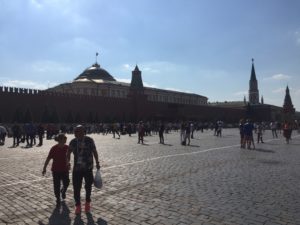In Bruce Springsteen’s 1973 album “Greetings from Asbury Park” (his first with the E Street Band), we listen to Bruce describe the process of growing up and setting roots down in a place in a song aptly titled “Growin’ Up”. After he describes the challenges, in the last verse he sings, “Well, my feet they finally took root in the earth…and I swear I found the key to the universe in the engine of an old parked car”. Perhaps this is symbolic of him finding his niche and learning to be comfortable with his identity. After eight weeks in Russia, I similarly feel that I have found an environment where I can embrace my appreciation of Russian culture and language, and I learned how to tackle new challenges of acculturation.
But now, it is time for me to say goodbye. Eight intense and incredible weeks here have left me with not only language gains and education but also more confidence in my capability to tackle new challenges. Those of you who know me well know that I’ve shared these sentiments of personal growth and confidence, and honestly that might be the most important accomplishment of this summer. In a couple days, I will concentrate more specifically on the language gains and education in my post-program reflection.
Over the course of this summer, there were many new and unfamiliar challenges and unfamiliar challenges in my daily interactions, but one
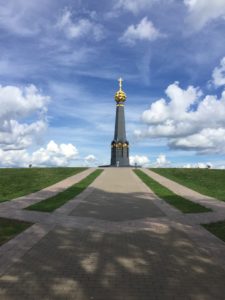
source of stability was my weekly Catholic Mass. Nestled within a city neighborhood stands a large, red brick Gothic-style cathedral, the Cathedral of the Immaculate Conception of the Blessed Virgin Mary. A couple of times I attended the English-French Mass but most of the time, I opted for the Russian Mass. Often I did not understand a lot of what was said, but I picked up responses and could also participate based on the consistency of the Catholic Mass. It was fulfilling when I finally understood some of the Gospel reading.
The status of Catholics in Russia remains complicated, as it is not recognized as one of the core religions of the Russian state. Significant doctrinal differences still stand between Russian Orthodox and Catholic Churches, and reconciliation has been slow. Given the alliance between
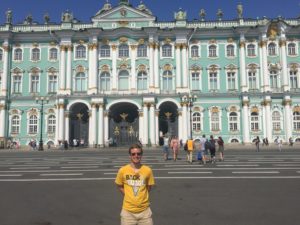
the government and the Russian Orthodox Church, Catholics can sometimes find themselves politically marginalized. For instance, the English-French Catholic community (mostly consisting of African and Southeast Asian immigrants) at the cathedral continues to look for a permanent home, as they were evicted from their previous building and have not been successful in litigation. For now, they have Mass in the crypt of the Cathedral.
As a whole, the Catholic community in Russia is a small one, consisting of probably less than 0.5% of the population. As my host brother-in-law told me, there are two active Catholic churches in Moscow, a city of 12 million people. The Cathedral of the Immaculate Conception is the most popular one, originally built by Polish Catholic immigrants at the turn of
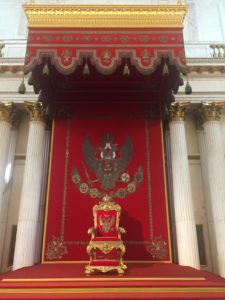
the 20th century. My host family are actually descendants of these Polish immigrants and are practicing Catholics. My host mother stated that she, as a Russian Catholic, has not felt excluded by her friends and colleagues who know her Catholic identity. Likewise, my host brother-in-law shared the idea that in a city as big as Moscow, it is easier to practice than it would be in a small city or village. Yes, Catholicism is in the minority, but this vibrant community continues to grow here in Moscow.
Now, time for a short recap of my adventures this past week:
- St. Petersburg / Lake Ladoga Cruise: Last Sunday evening, I traveled to St. Petersburg on an overnight train and explored the city on Monday
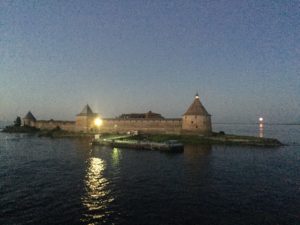
A fort from 1321 that guards the southern entrance to Lake Ladoga from the Neva River before boarding a river cruise to Lake Ladoga. The boat took us up the Neva River to the southern coast of Lake Ladoga, a huge freshwater lake northeast of St. Petersburg that allows for gorgeous views and cool breezes. We stopped at several monasteries and a quarry-turned-park that provided the stone to build structures like St. Isaac’s Cathedral in St. Petersburg. We also had the chance to view rural life in the Russian countryside, a far cry from the glamor of Moscow and Petersburg. The boat returned on Friday morning and after another day of exploring St. Petersburg and the Winter Palace, I returned to Moscow.
- Borodino: On Monday, I decided to take a day trip to visit Borodino, the site of the famous 1812 battle of the Napoleonic Wars and the
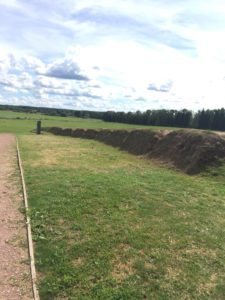
Fragment of the earthen barricades constructed by Russian artillery at the Battle of Borodino in 1812 bloodiest battle of the 19th century. Unfortunately, I picked the day to go when the museum itself was closed, but I was able to walk around the territory and see some of the various monuments. The most impressive structure is a huge monument that commemorates all of the soldiers at Borodino, which looks out over the rolling hills of the battlefield. The small towns alongside the monuments belied the area’s historical significance – you would never guess that this place was the site of one of the most famous engagements in Russian military history. I made my return trip interesting by missing my train, asking how to get to the next city for a train, taking a bus there, and then finally catching a commuter train back to Moscow.
- Lenin’s Mausoleum: As Lou Holtz once said, “If you have been here, no explanation is necessary. If you haven’t, none will suffice.” That’s all I have for this one.
- Exploring Moscow / My Favorite Place: Yesterday, I walked all around
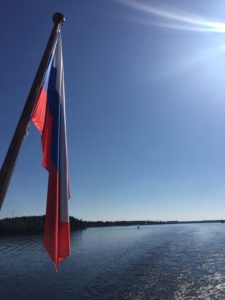
A view of Lake Ladoga from the back of the cruise ship Moscow to see everything one last time, and I made my way back to my favorite place – the Большой камменый мост, or simply, the Big Stone Bridge. Some of you might remember that I took a picture from this same bridge last year and this year, and it was here that my love for Russia and Moscow began. I was able to stop by, take another picture of the gorgeous view of the Kremlin, and reflect on the language and personal gains this summer.
- I will be flying back to Washington and then to Pittsburgh on Thursday, staying for four days before I return to Notre Dame. I want to thank everyone who has been reading and following my summer adventures, and I hope that you have all learned along with me. I will write a brief closing blog in a couple days, but this will be my last comprehensive post. I have greatly enjoyed sharing my experiences abroad and perhaps my second “growing up” as a result of language immersion. I only hope that I will have the chance to blog live from Russia in the near future.

